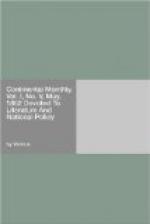If the people would know where their foes are most active, let them look at home. Months ago they were warned that this very trick would be tried among us on behalf of the South. Months ago the Louisville Journal, in speaking of the manner in which Southern spies in the North were working by treachery, declared that ’they wound a net-work of influences around Congress and the powers that be, to retain men in the departments and to get others in—especially in the War Department—who were shining lights in the ‘castles’ of the K.G.C. for the avowed and express purpose of aiding the enemy by treacherously watching and conveying the secrets of the Government to the rebel army.’
Has not this accusation been abundantly proved? Does not the whole country know that traitors, ‘democratic’ traitors, have acted so successfully as spies that nothing has been kept secret from the enemy?
’Men were selected in the States and sent hundreds of miles to Washington, with strong influences to back them for this purpose. Better to carry out their project, they adroitly raised the ‘No Party’ cry, and by professing the most exalted and devoted loyalty, claimed the best places in which to betray the Union cause.’ ’They claim a large number of the officers of companies, regiments, brigades, and divisions, and even have the audacity to whisper that General McClellan understands their programme and is not unfavorable to working up to it.’
Fortunately the great mass of the Northern people can not be affected by such traitorous tricks. There is but one party in the country, and that is the Union and the War party. Here and there a coward may waver and be frightened at the prospect of a Democratic opposition raising its head successfully to withstand the great onward movement, but his quavering voice will be unheard in the great cry for battle. We have accepted this war with all its fearful risks, and we will abide by it. We will be true to our principle of a united country, we will be true to our word to crush rebellion, and we will be true to our brave soldiers who are fighting manfully for the right. If we adhere steadfastly to these resolutions, we shall have no cause to dread traitors within or foes without the loyal Union.
When the World’s Fair was held in 1851, in London, Punch, moved by the intensest spirit of British conceit, politely suggested that it would be a good plan to have placards containing the words, ’It is good to have the conceit taken out of us,’ in all languages, hung all over the Exhibition—the intention being to courteously intimate to foreigners their general inferiority to John Bull. Certainly it is a good thing to have the conceit taken out of us—with the saving clause added by our contributor, H.P.L.—’so that it be not done with the corkscrew of ignorance,’ or of conceit itself, as is generally the case when English wit attempts such extraction. Yet it must be admitted that in one thing Brother Jonathan has very fairly had the conceit taken out of him—which need not have been, had he only attended to the lessons taught him by John Bull and Jean Crapaud.




